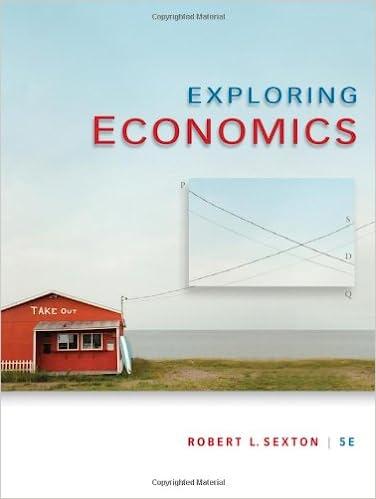Multiple Choice Questions: 1. If high-yield investment opportunities attract capital from abroad and lead to a capital
Question:
1. If high-yield investment opportunities attract capital from abroad and lead to a capital account surplus, then the
a. Nation’s currency must appreciate.
b. Nation’s currency must depreciate.
c. Nation must run a current account deficit under a flexible exchange rate system.
d. Nation must run a current account surplus under a flexible exchange rate system.
e. Both a and c are true.
2. If the dollar depreciates, it can be said that
a. Foreign countries no longer respect the United States.
b. Other currencies appreciate.
c. It falls in value just as it does during inflation.
d. It takes fewer dollars to buy units of other currencies.
e. All of the above are correct.
3. On May 16, 1999, it cost $0.667 to buy one Canadian dollar. How many Canadian dollars would $1 U.S. buy?
a. $1.50
b. $1.30
c. $1.00
d. $0.67
4. If the exchange rate between the dollar and the euro changes from $1 = 1 euro to $2 = 1 euro, then?
a. European goods will become less expensive for Americans, and imports of European goods to the United States will rise.
b. European goods will become less expensive for Americans, and imports of European goods to the United States will fall.
c. European goods will become more expensive for Americans, and imports of European goods to the United States will rise.
d. European goods will become more expensive for Americans, and imports of European goods to the United States will fall.
5. If the price in dollars of Mexican pesos changes from $0.10 per peso to $0.14 per peso, the peso has
a. Appreciated.
b. Depreciated.
c. Devalued.
d. Stayed at the same exchange rate.
6. Which of the following is most likely to favor the appreciation of the American dollar?
a. A German professor on vacation in Iowa
b. An American professor on extended vacation in Paris
c. An American farmer who relies on exports
d. Disney World
7. If the dollar appreciates relative to other currencies, which of the following is true?
a. It takes more of the other currency to buy a dollar.
b. It takes less of the other currency to buy a dollar.
c. No change occurs in the currency needed to buy a dollar.
d. Not enough information is available to make a determination.
8. If the United States experiences a sharp increase in exports, what will happen to demand for the U.S. dollar?
a. It will decrease.
b. It will increase.
c. It will be unchanged.
d. It will change at the same rate as the supply of dollars will change.
e. There is not enough information to make a determination.
9. If fewer British tourists visit the Grand Canyon, what is the effect in the exchange market?
a. It will increase the supply of British pounds.
b. It will decrease the supply of British pounds.
c. It will increase the demand for British pounds.
d. It will decrease the demand for British pounds.
Exchange Rate
The value of one currency for the purpose of conversion to another. Exchange Rate means on any day, for purposes of determining the Dollar Equivalent of any currency other than Dollars, the rate at which such currency may be exchanged into Dollars...
Fantastic news! We've Found the answer you've been seeking!
Step by Step Answer:
Related Book For 

Question Posted:





